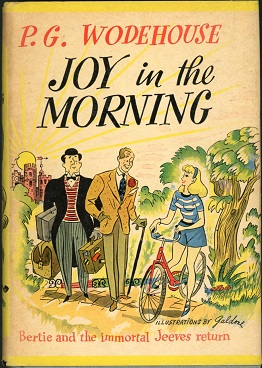Joy in the Morning (1946 novel)

First US edition
|
|
| Author | P. G. Wodehouse |
|---|---|
| Country | United Kingdom |
| Language | English |
| Series | Jeeves |
| Genre | Humour |
| Publisher | Herbert Jenkins, Doubleday, Doran |
|
Publication date
|
22 August 1946 |
| Media type | |
| Preceded by | The Code of the Woosters |
| Followed by | The Mating Season |
Joy in the Morning is a novel by P.G. Wodehouse, first published in the United States on 22 August 1946, by Doubleday & Co., New York, and in the United Kingdom on 2 June 1947, by Herbert Jenkins, London. Some later American paperback editions bore the title Jeeves in the Morning.
The story is another adventure of Bertie Wooster and his resourceful valet Jeeves.
The title derives from an English translation of Psalms 30:5:
Wodehouse was working on the novel in Le Touquet (France) before he was interned by the occupying German authorities. He completed the book in Germany after his wife, Ethel, brought the unfinished manuscript with her when she joined her husband in Berlin. The manuscript was completed in Degenershausen, a small village in the Harz mountains.
Short summary
More detailed summary
Robert McCrum, Wodehouse's biographer, states that Joy in the Morning is "thought by a fervent minority to be his masterpiece". Richard Usborne, who wrote several books about Wodehouse, considered that Joy in the Morning was perhaps the best of the author's books: "If I had to pick one as his happiest, best constructed and most jewel-encrusted, I'd say Joy in the Morning". Frances Donaldson, who also wrote a biography of Wodehouse, did not rate the book quite so highly, considering that some of Wodehouse's other novels, including the Jeeves-Wooster stories Right Ho, Jeeves and The Mating Season were superior.
Usborne used Joy in the Morning to highlight the extreme perils of attempting to translate Wodehouse's English into another language, in view of the hotch-potch of slangs, quotations and allusions that Wodehouse employs. He compares Wodehouse's original text with a translation of Joy in the Morning into French by Denyse and Benoît de Fanscolombe, published by Amiot-Dumont under the title Jeeves, au secours!. Thus Wodehouse's phrase "to give the little snurge six of the best with a bludgeon" becomes, in French, "flanquer au maudit galopin une volée de martinet".
...
Wikipedia
